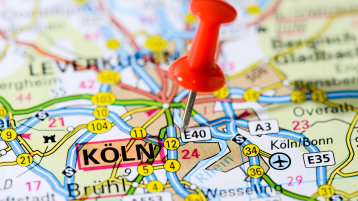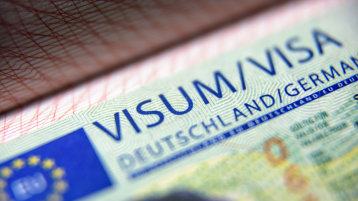After your Arrival

You have finally made it to Germany – but what’s next? Registering with the city? Opening up a bank account? Where and how do I do these things? Upon your arrival in Germany, there are quite a number of organizational steps to take and things to bear in mind. On this webpage, we have compiled all essential information and addresses for your first days in Germany.
Jump to
Registering your place of residence
Tax Identification Number
A Tax Identification Number (IdNr. or Steuer-IdNr.) may be needed to open a bank account. It will be sent to you by post after you have registered your address with the city.
If you intend to stay in Germany for more than three months, you are required to register your new place of residence with the residents’ registration office (Einwohnermeldeamt) in the city where your new place of residence is located. You are required to register your address within two weeks after your arrival in Germany. Should you change places during your stay, please make sure to inform the registration office as well.
You are required to present the following documents when registering with the city:
- a valid passport
- a signed confirmation from your landlord*landlady (Wohnungsgeberbescheinigung)
If you do not have a fixed accommodation after your arrival and are staying in a hotel/hostel for the first few weeks, it may also be possible to obtain the confirmation (Wohnungsgeberbescheinigung) from the hotel/hostel. However, not all hotels/hostels issue this confirmation. Please check with your hotel/hostel in advance.
As Cologne has a number of residents’ registration offices, you are free to choose which one to visit. If you have taken up residency outside of Cologne, please visit the respective residents' registration office within your municipality. The addresses of the most centrally located registration offices in Cologne, Gummersbach, Hürth and Leverkusen are listed here:
Residence permit from the Immigration Office
All international students and guest scholars who are not EU/EEA or Swiss nationals and who did not enter via the European directive EU2016/801, must apply for a residence permit at the Immigration Office after their arrival in Germany if they wish to stay in Germany for longer than three months.
International students and guest scholars who do not have EU/EEA citizenship and were allowed to enter without a visa must also apply for a residence permit at the Immigration Office if they wish to stay in Germany for longer than three months.
You can find the most important information on this topic as well as the addresses of the surrounding immigration offices on the page Visa and Residence Permit.
Tax identification number
The tax identification number is your very personal tax number.
The abbreviation is IdNr. or tax-ID and it consists of 11 numbers (e.g. 99 999 999 999). Please keep the letter with your number in a safe place.
The IdNr will be sent to you automatically by the Federal Central Tax Office (BZSt) after your registration with the city. Further information can also be found on the BZSt website.
Every person who is or has been registered in Germany has their own IdNr. It remains valid for life and does not change even if you move house or get married.
You will always need your tax-ID if you have dealings with the tax office. Many other offices will ask for your tax-ID in order to report the taxes you have already paid to the tax office.
- your employer
- your health insurance company
- your bank
- the employment agency
- Pension insurance
Social Security Number
You need a social security number if you (want to) work in Germany. It is also called pension insurance number and once it has been issued, it is valid for life. It consists of 12 digits (e.g. 14 230460 S 534).
The social security number is your proof that you are part of the German social security system.
If you have statutory health insurance, you will automatically receive your social security number by post from the German Pension Insurance (Deutsche Rentenversicherung) to the address you have given to your health insurance company approx. 4-6 weeks after registering with your health insurance company.
If you have private health insurance, you must apply for a social security number from the German Pension Insurance. You can do this by going to a branch office in person and being registered in Germany. If you are working in Germany for the first time, your employer can help you apply for your social security number. This process can be handled via your employer's digital payroll system.
After your employer has registered you, you should receive an official letter from the German Pension Insurance by post containing your social security number. This usually takes between 4 and 6 weeks and will be sent to your German address. It is important that you keep this document in a safe place.
Bank account
We recommend that you open a bank account with a German bank. This is particularly convenient for having your rent debited directly, for receiving scholarship payments and for transferring the student semester fee. It is generally possible for you to open up a bank account with any bank in your city of residence.
Before opening an account, please consult your bank on which documents you will need to bring, as this tends to vary from one bank to another. Most banks usually require you to present the following documents:
- valid passport
- for international students: certificate of enrollment of TH Köln
- certificate of registration with the city authorities
- Tax Identification Number (IdNr)
Please make sure that you bring sufficient funds (cash/credit card) for the first six weeks, as opening a bank account sometimes takes some time.
Public Broadcasting Fee
Public Broadcasting Fee
Please take into account that in addition to regular costs of living, students are required to pay a public broadcasting fee (Rundfunkbeitrag) for the use of the German public television, radio and online services. Generally speaking, every household in Germany is required to pay this fee, international students included.
Under certain circumstances, students can be exempted from paying contributions. For detailed advice and help with the application process, please contact the social counseling service of the AStA of TH Köln at sozialberatung@asta.th-koeln.de.




